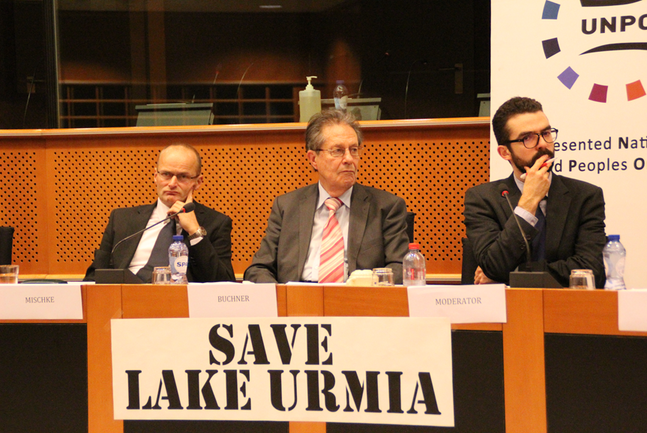The Unrepresented Nations and Peoples Organization (UNPO) and the Southern Azerbaijan Alliance convened a conference at the European Parliament, entitled ‘Lake Urmia – Humanitarian and Environmental Disaster in Iran’. Aimed at examining the potentially devastating and far-reaching consequences of the crisis surrounding Lake Urmia, the roundtable event also addressed the possible role the EU could play in reversing an environmental catastrophe that stands to devastate the lake’s bio-diverse ecosystem and the surrounding population in an already politically volatile region.
Lake Urmia, a UNESCO-registered bio-reserve, was once one of the world’s largest saline lakes, but due to significant declines in water level over the past ten years, the lake has shrunk by nearly 90% and is currently almost at the point of no return. Justified by agricultural and economic interests, destructive and unsustainable human activity has severely affected the lake basin, which has seen the construction of a highway, a bridge, dams and reservoirs.
Dr Steffen Mischke, Professor at the University of Iceland, outlined the reasons behind the rapid disappearance of Lake Urmia; the scientific community has at its disposal data, which shows that this is due to human activity. His graphic presentation demonstrated that neither a change in precipitation nor temperature could have caused the lake’s deterioration, especially since the pattern of droughts in the region has not changed significantly in the past several decades Instead, Dr Mischke pointed out that a third indicator – change in water usage and intensive irrigation farming – appears to be the leading cause behind Urmia’s sudden transformation. He further enlightened the audience with lessons learned by comparing Lake Urmia to other cases with geological similarities: Lop Nur Lake in China, which disappeared due to intensive irrigation farming; the Dead Sea, now partly dry due to irrigation, industrial use, population increase and salt production; and the Aral Sea, one of the planet’s worst environmental disasters created by large-scale irrigation of cotton fields.
More information about the conference at http://unpo.org/article/18729

